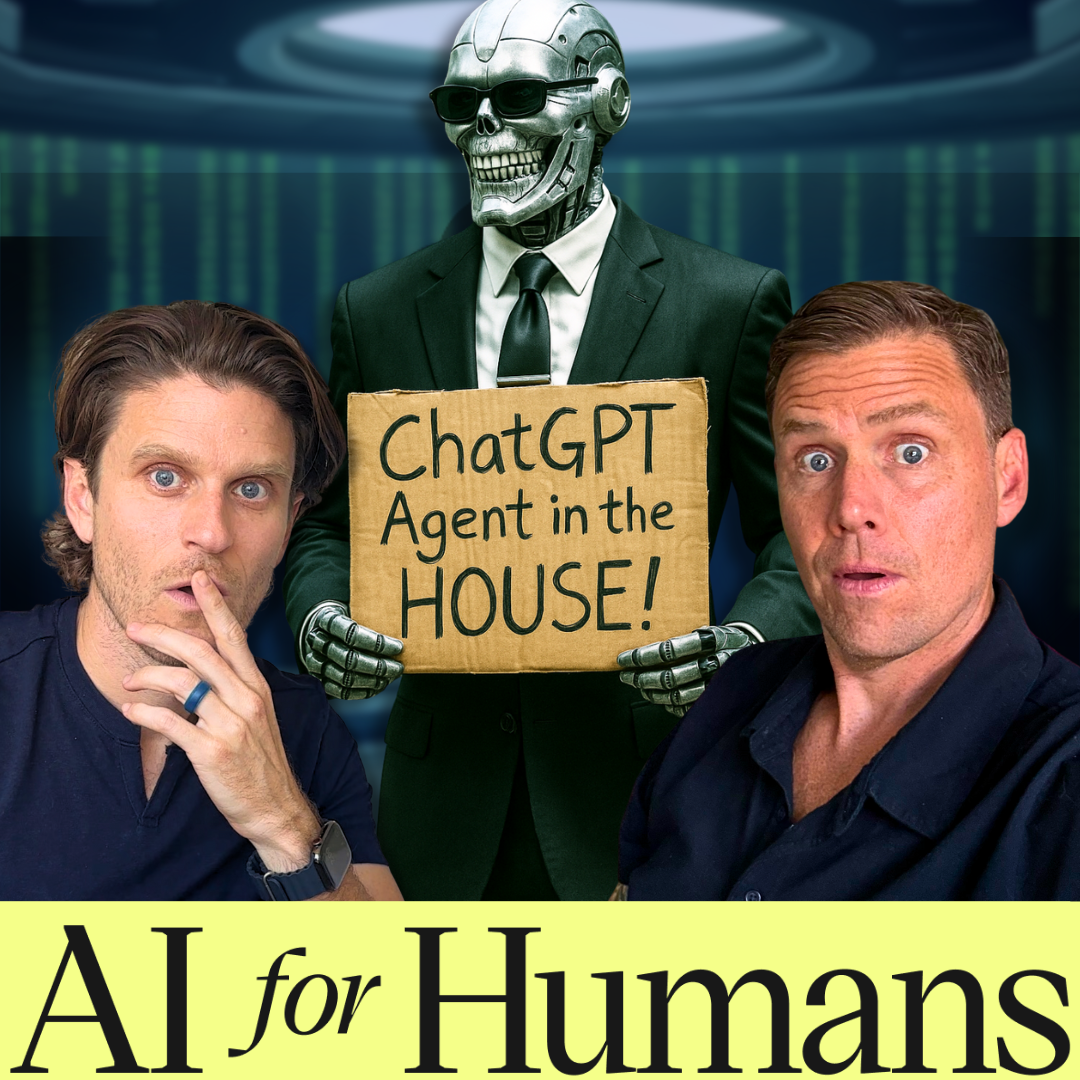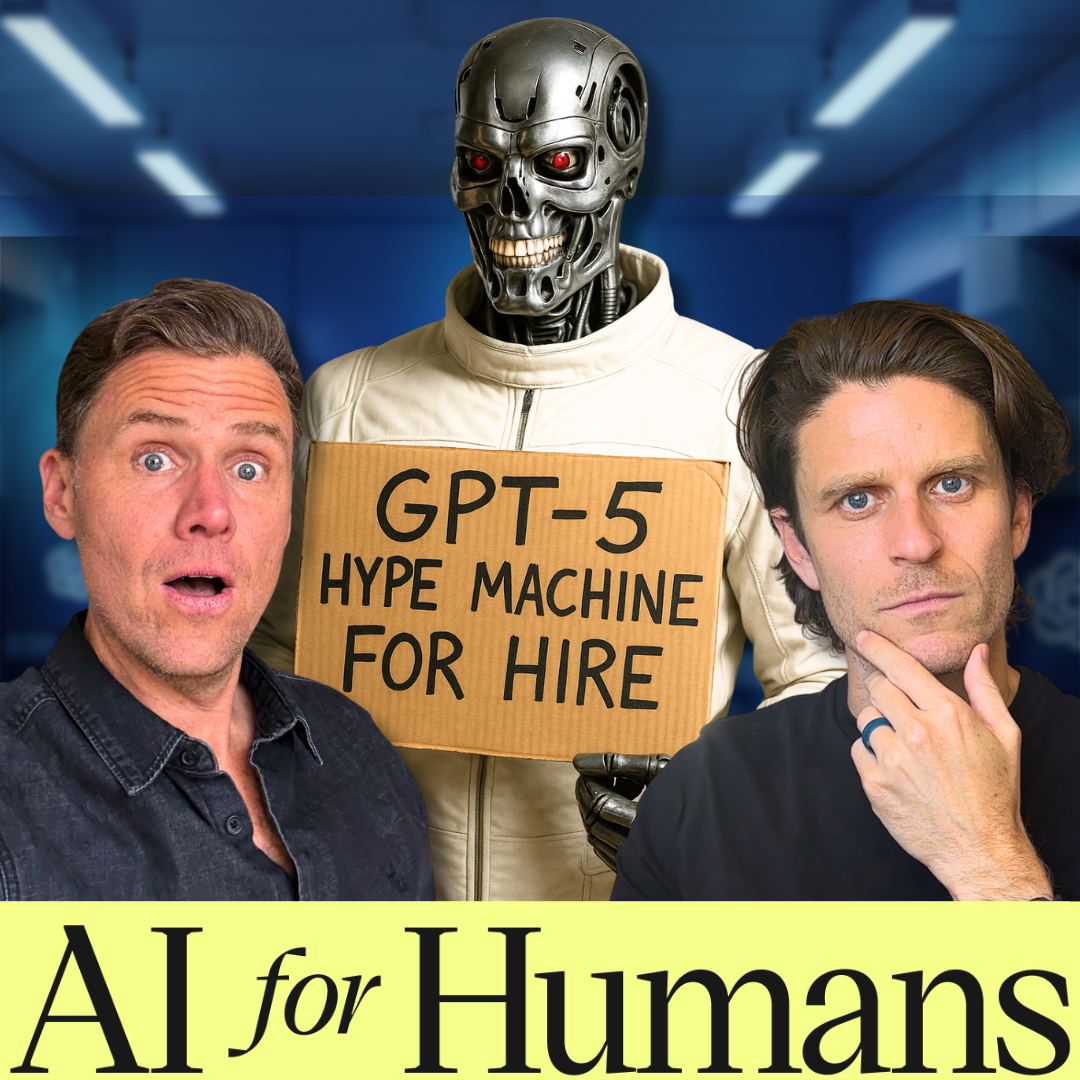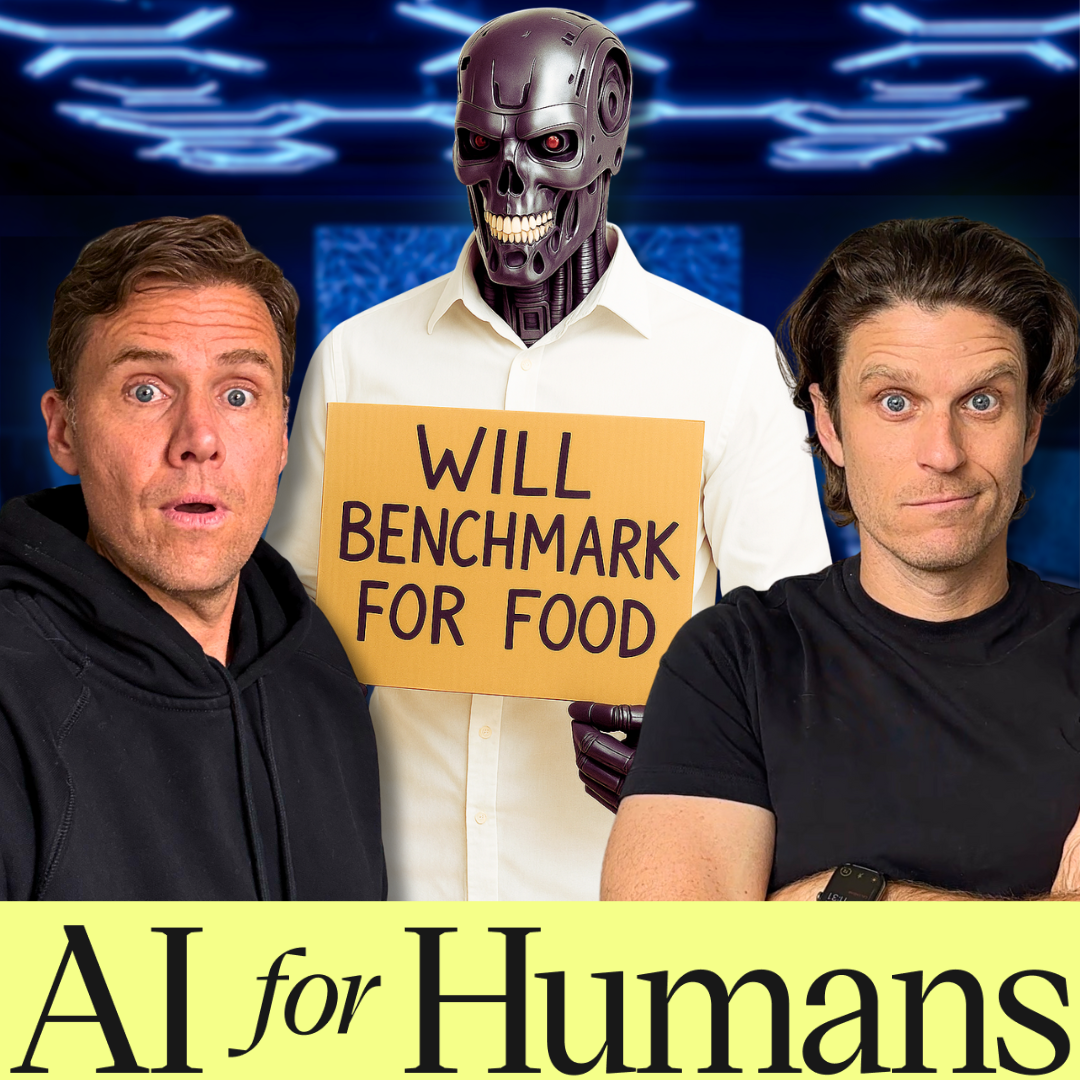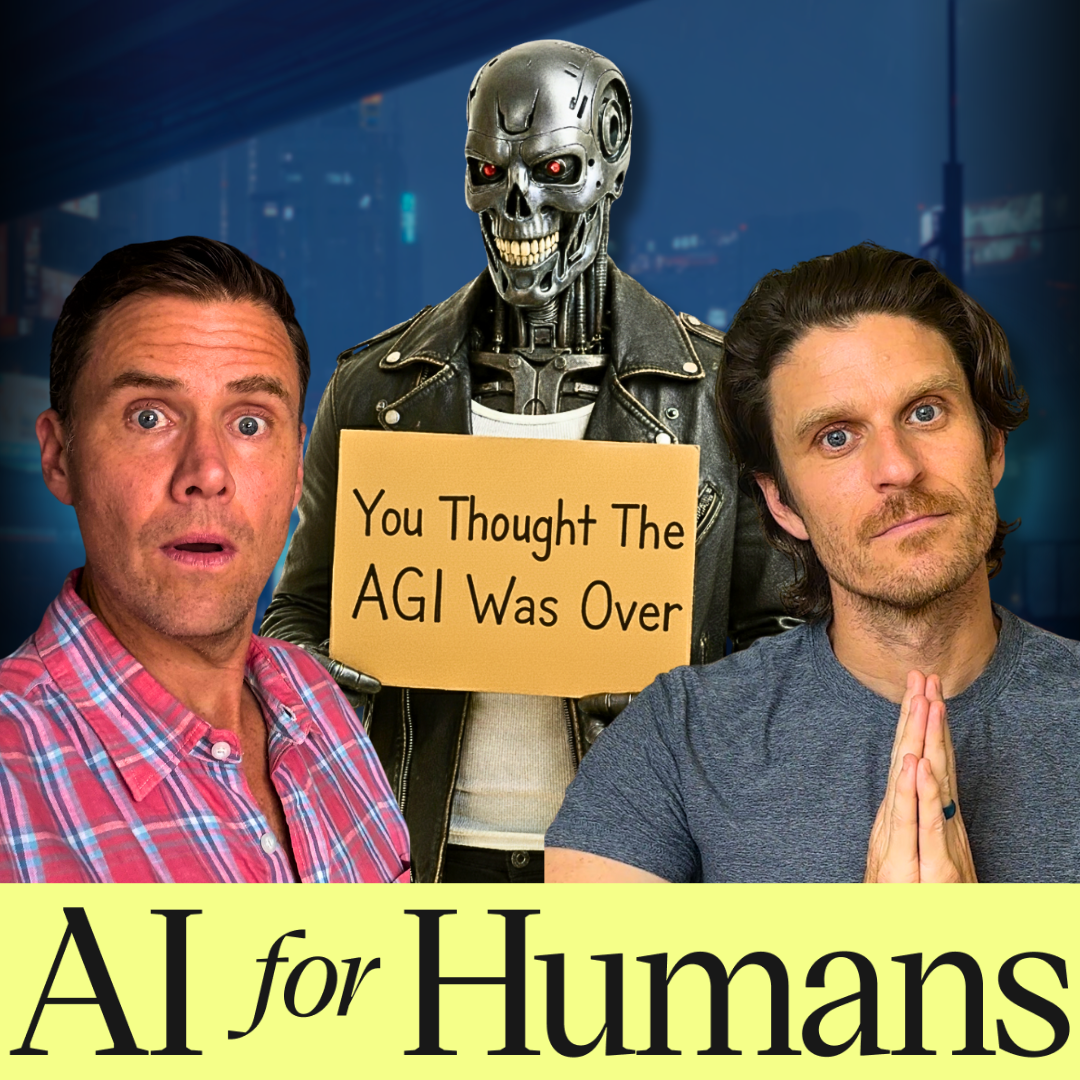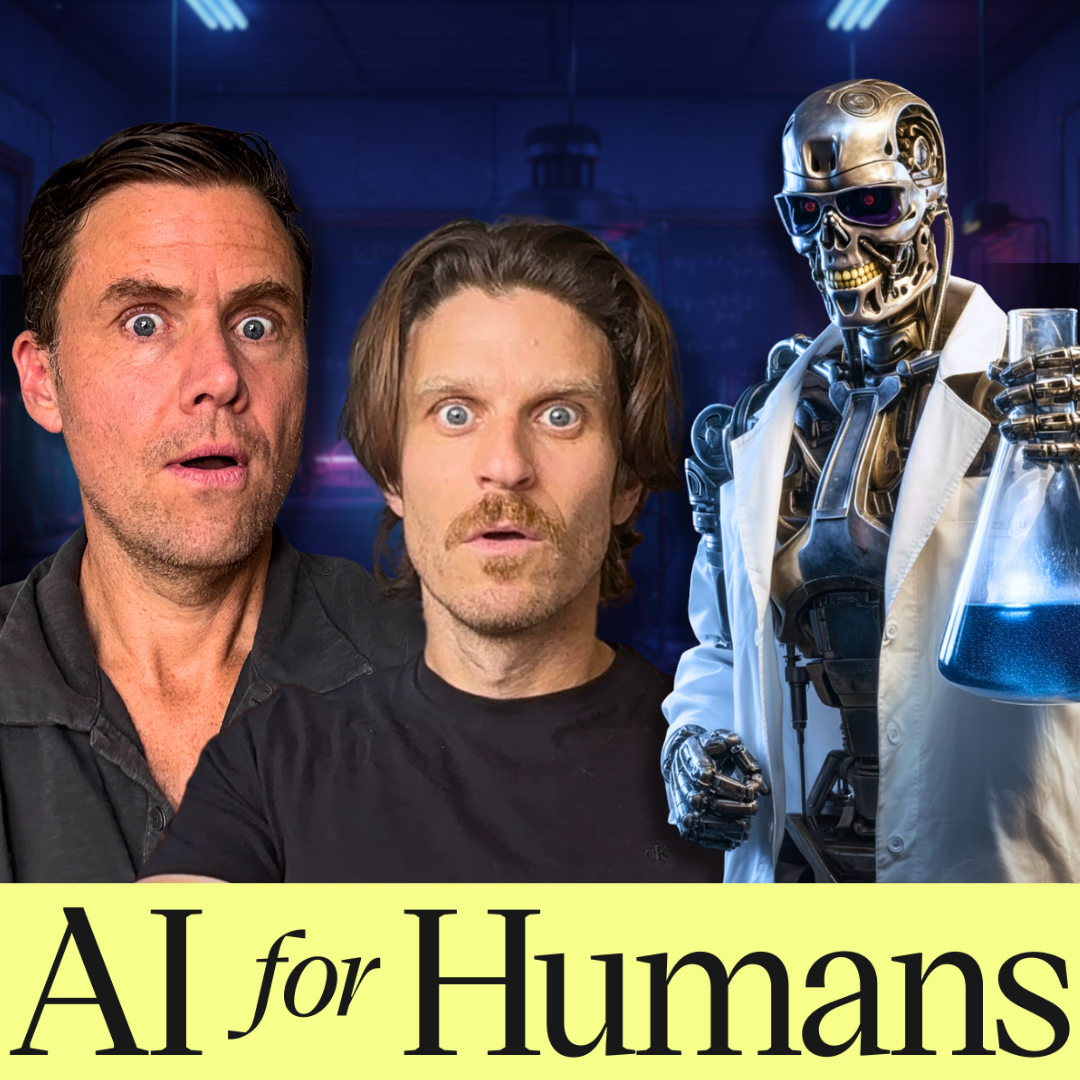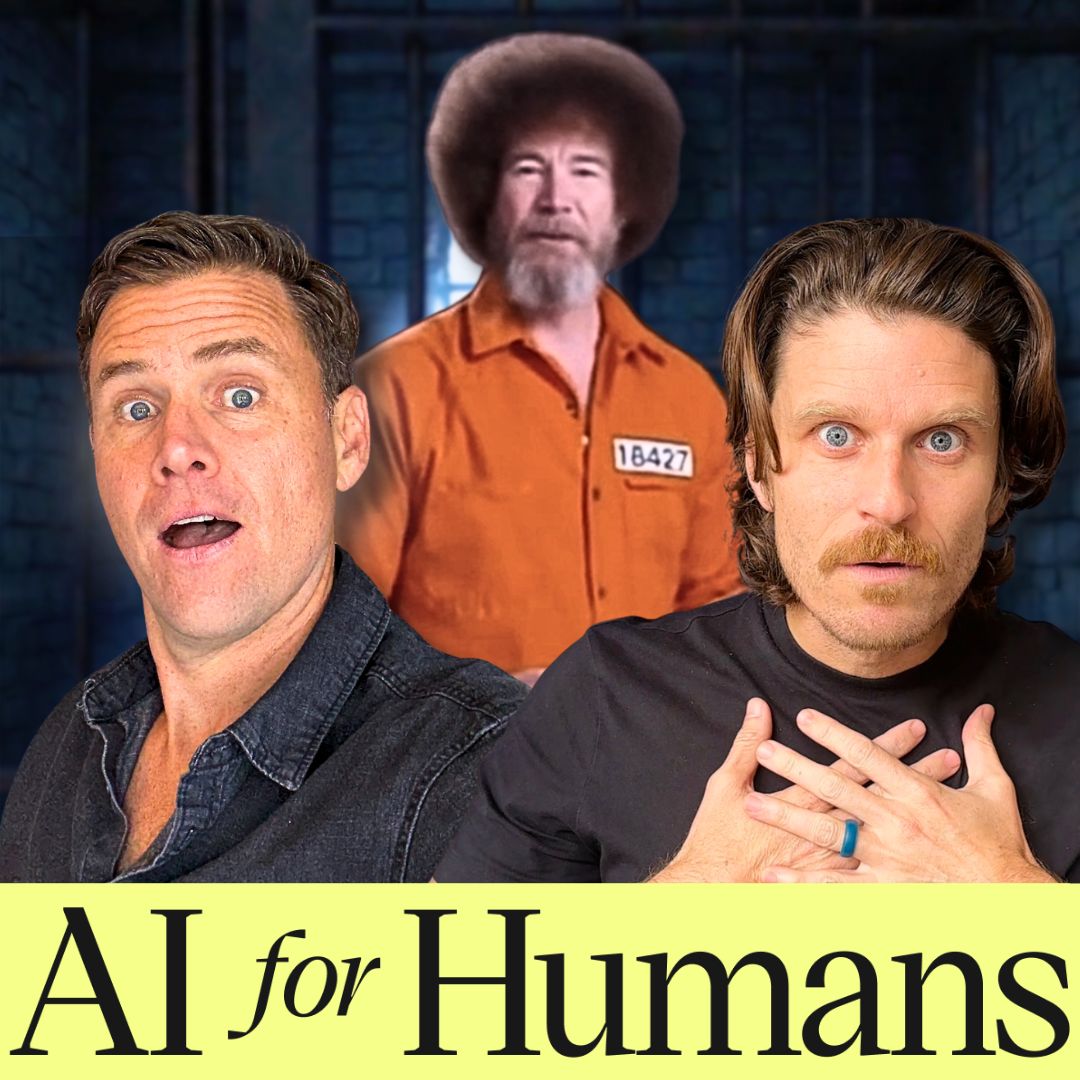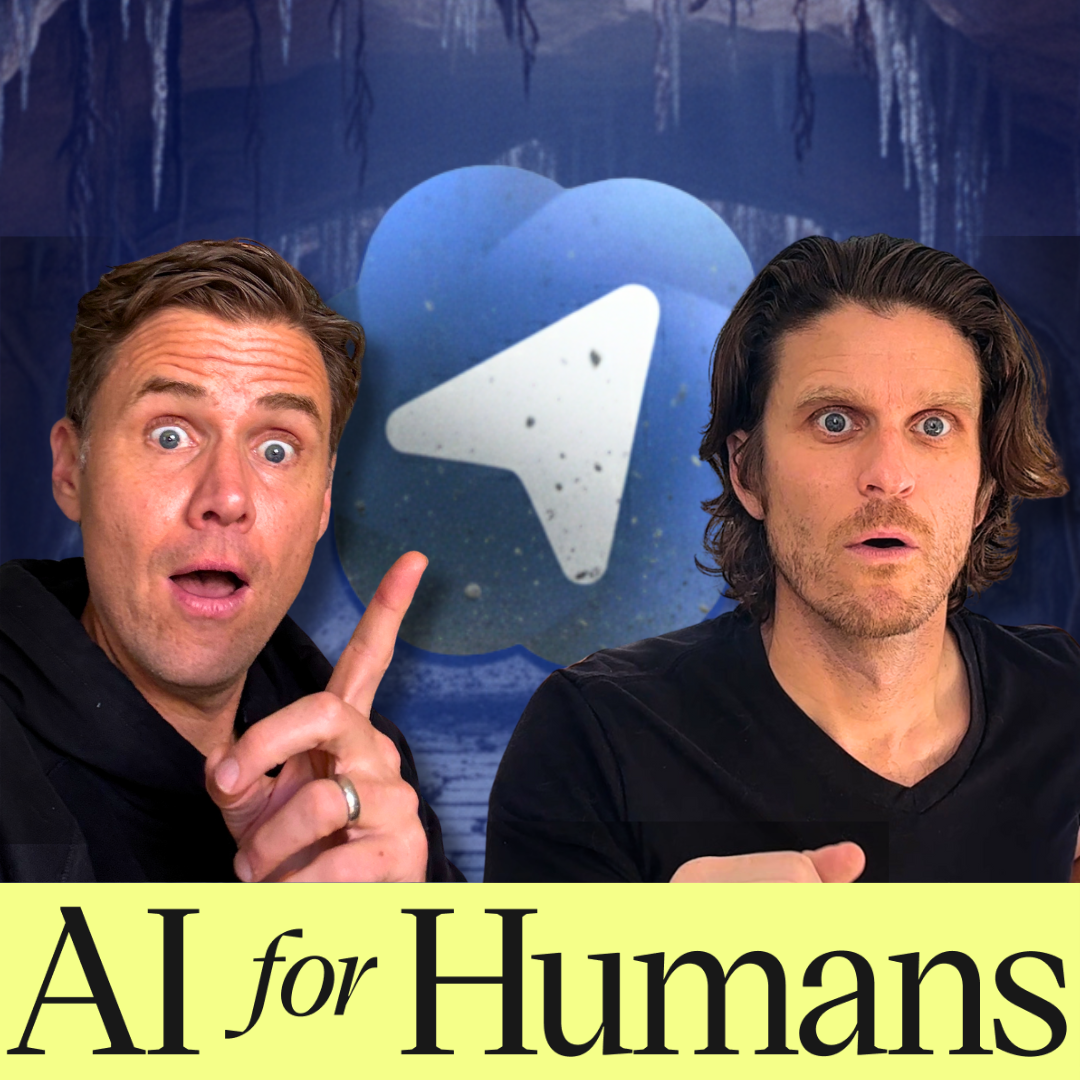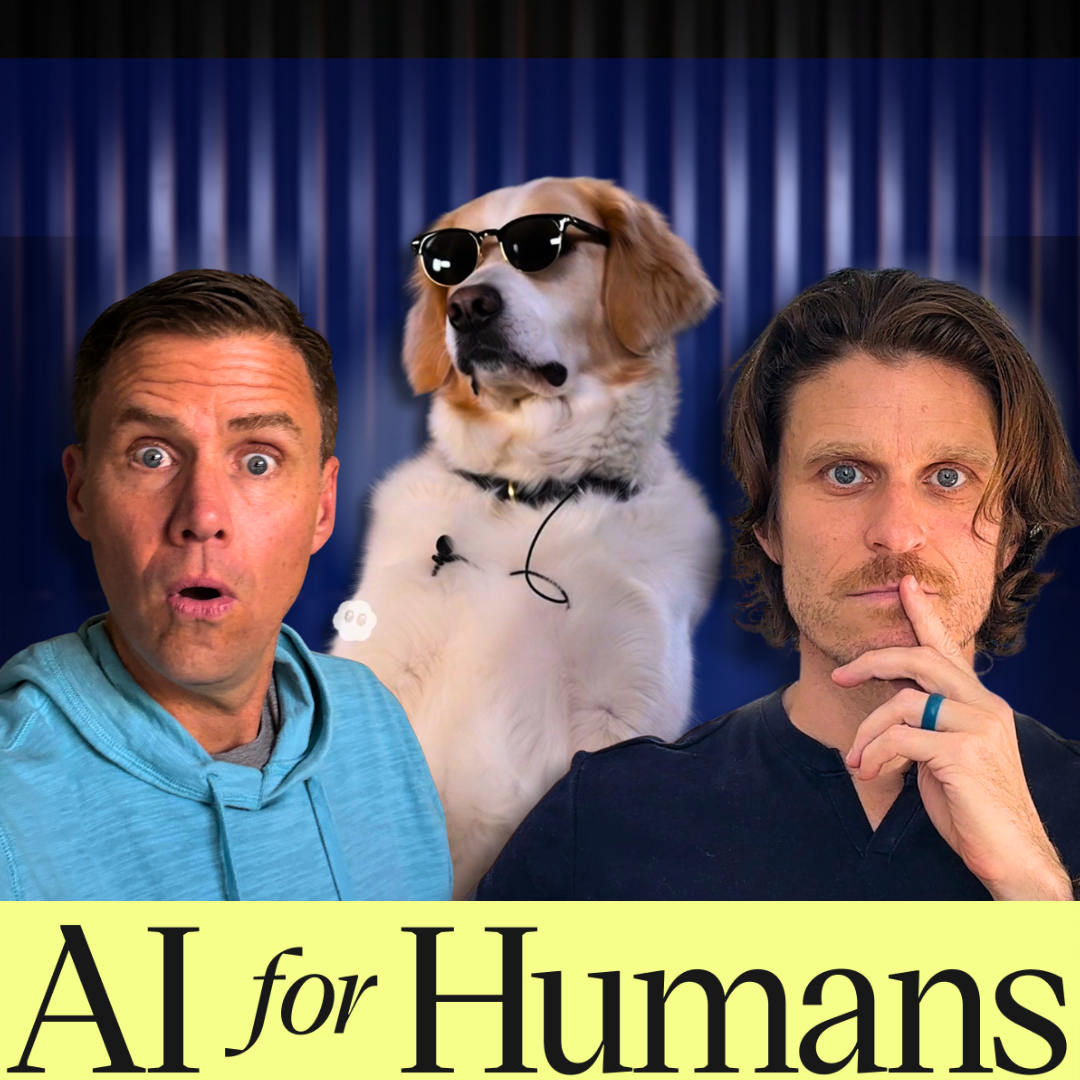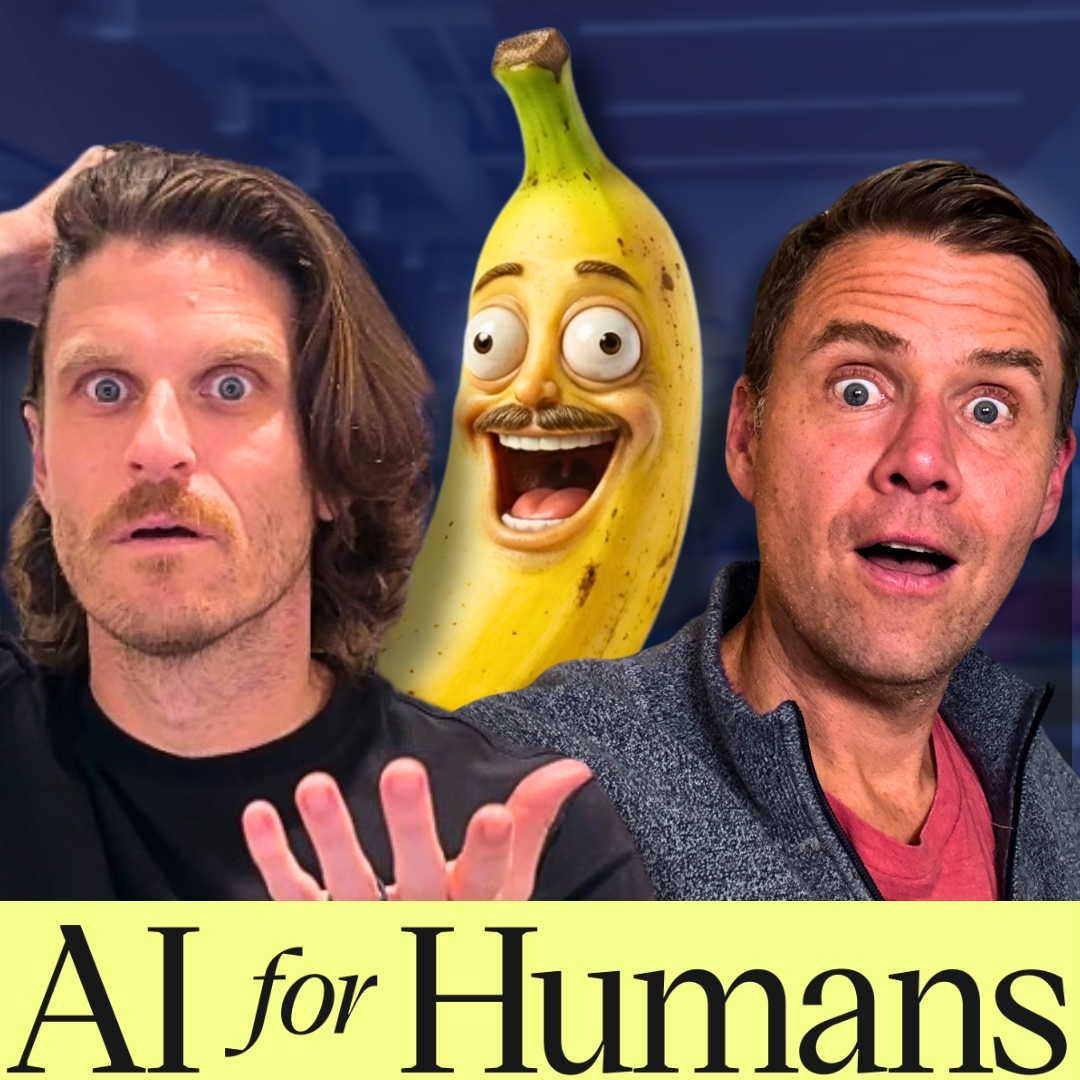OpenAI's Roadmap to AGI, Google's AlphaEvolve Codes Itself & So Many AI Babies

OpenAI’s Sam Atlman discussed the next three years of AI advancements while Google’s brand new AlphaEvolve model codes new algorithms on its own. And good lord, the babies.
We also dig into OpenAI HealthBench out-diagnosing real doctors, Anthropic’s rumored reasoning-hybrid Opus & Sonnet updates, and Tesla’s newly refreshed sim-to-real dancing Optimus robot.
Plus, Gavin’s free build of an AI baby podcast clip and Kevin’s take on why recursive self-learning changes everything, Stable AI’s on-device Stable Audio music generator, and Runway “References” turning old photos into time-travel podcasts.
And a Unitree robot casually stomping toddlers’ sneakers. For science, of course.
NAP TIME IS OVER. THE AI BABIES ARE RUNNING THE SHOW.
#ai #ainews #openai
Join the discord: https://discord.gg/muD2TYgC8f
Join our Patreon: https://www.patreon.com/AIForHumansShow
AI For Humans Newsletter: https://aiforhumans.beehiiv.com/
Follow us for more on X @AIForHumansShow
Join our TikTok @aiforhumansshow
To book us for speaking, please visit our website: https://www.aiforhumans.show/
// Show Links //
Sam Altman’s Roadmap For the Next Three Years (2025 agents, 2026 healthcare + new science, 2027 robots)
https://youtu.be/ctcMA6chfDY?si=SRE0aV8bJC5yK_V3
Google Deepmind’s AlphaEvolve
Google’s New “always-on” AI Software Agent
New Anthropic models of Claude & Opus Rumored https://www.theinformation.com/articles/anthropics-upcoming-models-will-think-think?rc=c3oojq&shared=41004a70b4c5766a
OAI Head of Research Says Models Capable of “Original Thinking”
https://www.nature.com/articles/d41586-025-01485-2
OpenAI’s Health bench
https://openai.com/index/healthbench/
New Tesla Optimus Dancing Video
https://x.com/Tesla_Optimus/status/1922456791549427867
Unitree Robot Steps on a kids foot
https://www.reddit.com/r/singularity/comments/1khm8lc/unitree_g1_steps_on_a_childs_foot/
Sam + Elon + More in Saudi Arabia
https://www.nytimes.com/2025/05/13/us/politics/trump-saudi-business-lunch-musk-altman.html
Stargate in the UAE
https://www.theinformation.com/briefings/openai-announce-stargate-data-center-uae?rc=c3oojq
Baby Podcast TakeOver
The first big one
https://www.tiktok.com/@jonlajoiecomedy/video/7495865672107379999
Theo Von’s Baby Podcast
https://www.tiktok.com/@theovon/video/7501807442838293790
Our Old Baby Podcast
https://x.com/AIForHumansShow/status/1826784353046986987
Very Good Neal de Grasse Tyson DeepFake
AI Pope (well, really the new Pope picked his name cuz of AI)
https://www.reddit.com/r/singularity/comments/1kkp7yt/leo_xiv_bachelor_of_science_degree_in_mathematics/?utm_source=share&utm_medium=web3x&utm_name=web3xcss&utm_term=1&utm_content=share_button
Copyright AI Drama
https://x.com/LuizaJarovsky/status/1921286826402422927
Head of Copyright Office Fired
https://www.theguardian.com/us-news/2025/may/12/trump-fires-copyright-office-shira-perlmutter
Immense Verge Follow-Up (might be hardcore copyright people rather than AI friendly people)
https://www.theverge.com/politics/666179/maga-elon-musk-sacks-copyright-office-perlmutter
Stable Audio Small
https://x.com/StabilityAI/status/1922675163411497094
The Colorless Man
https://www.reddit.com/r/midjourney/comments/1kls7kl/the_colorless_man_short_film_made_with_a_600/
Point & Click AI Art Driven Game
https://x.com/alexfredo87/status/1921653801909383631
DXRG Trader AI Agent Game
https://x.com/DXRGai/status/1922389687207133587
Runway References Examples
https://x.com/AIForHumansShow/status/1921229447627165946
https://x.com/runwayml/status/1922336106676212161/photo/1
https://x.com/c_valenzuelab/status/1922091462277169558
https://x.com/c_valenzuelab/status/1922016949300552073
audio_109
Kevin Pereira: [00:00:00] There were huge advancements across several AI fronts this week, autonomous agents, robotics, scientific breakthroughs,
Gavin Purcell: and babies. Kevin, it's AI for babies.
Kevin Pereira: Yes. Yes, Gavin Babies for sure. We'll actually show you how you can make your own baby podcast because that has taken over the entire internet. But in the meantime, new models from Anthropic and Google's alpha Evolve are showing that AI can actually generate and create new algorithms.
Gavin Purcell: And this is a and open AI introduces health bench to start tracking updates in AI science Plus a very cool to update from Tesla's optimist, robot, why? Why are you still a baby? Better question is, Kevin, why are you not a baby?
Kevin Pereira: That's actually very fair. Also, the new Pope is focused on artificial intelligence, a massive drama in the AI copyright fight.
You know, I think this is how my wife sees me whenever we argue
Gavin Purcell: this is AI for babies and humans.
Welcome everybody. [00:01:00] A big, big week in ai. We are gonna get some major announcements next week with Google's io, but before we get to that, a lot of stuff has dropped this week, Kevin. Uh, it feels like we are starting to ramp up again. I call this AI season. Would you call it that?
Kevin Pereira: Yes, I have to take my Allegra, uh, I start to get the sniffles and uh, I get very inflamed.
But that's how I know a new foundational model is about to drop. Gavin's. There's something in the air.
Gavin Purcell: That's right. We're gonna start with a clip from Sam Alman at a very good interview he did with Sequoia Capital in their office. And I wanna play this clip 'cause it's gonna introduce a bunch of the stuff we're talking about today
at, at a higher level of detail.
I kind of think 2025 will be. A year of sort of agents doing work coding in particular, I would expect to be a dominant category. I think there'll be a few others too. Um, next year is a year where I would expect more like a sort of AI's discovering new stuff. And maybe we have AI make some very large scientific [00:02:00] discoveries or assist humans in doing that.
And, you know, I'm, I am kind of a believer that most of the sort of real sustainable. Economic growth in human history comes from once you've like kind of spread out and colonized the earth. Most of it comes from just better scientific knowledge and, and then implementing that for the world.
Kevin Pereira: Uh, I'm sorry, did he say 2026?
Sam Altman? Uh, I'm, I'm starting to feel like it's more like Slack, Altman. Am I right Gavin because of that? Sure, you're right. Keep playing the click discoveries. Keep playing the click. Okay.
And then 27 I, I would guess is the year where like that all moves from the sort of intellectual realm to the physical world and.
Robots.
Kevin Pereira: Uh, robots, right? Robots, not just the sexy ones.
Gavin Purcell: All right. So, yes, we've heard this, this is very interesting. We're gonna go through each of those things, but ke before we jump in, I gotta remind everybody what a beautiful voice Sam Bowman has, and I could just listen to it for hours. It feels to me like just water pouring over my ears in the most wonderful way.
Kevin Pereira: Oh, that's, I thought that meant like water torture, where it's the slow drip. I used, I vibe coated a [00:03:00] Sam Altman white Noise machine, and it's just him. Reciting like children's, uh, stories and stuff to me, but it's that voice and I put it on at night once the sleep mask is on and it sends me right to sleep.
Gavin Purcell: All three of these things we have news on this week and Sam laid them out by 25, 26, 27. But Kevin, we wanna start with 25 and the idea of agents happening this year. There's a massive news story from Google that literally just dropped. Alpha Evolve is a new. Algorithm discovering AI agents. So this is a big deal.
Like we said, Google IO is next week and we assume that they're dropping a few things now so they can get ahead of open AI in case they've got some surprises for us. But what's really cool about this is Google has been saying for a while that they are like writing some of the code internally on what they do.
This is a new algorithm discovering AI model, meaning that it is not just regurgitating stuff that it has seen before. One of the craziest stats here, Kev, was that. In 75% of cases, [00:04:00] it discovered the best solution known so far, but in 20% of cases it improved on the previously best known solution, thus yielding new discoveries.
And this is a giant deal.
Kevin Pereira: And this was on, uh, they, they threw 50 problems at it across like analysis, geometry, combinatorics, Gavin.
Gavin Purcell: I'm a, I'm a brilliant combinatorics uh, uh, scholar. Think
Kevin Pereira: I've been doing that for years. I think my mom had a combinatorics VHS that she used to do for fitness. Yeah. That's about
Gavin Purcell: putting Legos together, right?
It's like I can combinatorics, uh, the Dark Knight set really well. It's pretty incredible. It
Kevin Pereira: does, it does sound like a knockoff Power Rangers thing that someone had, like we're the combinatorics. Um, but no, so, so they, they, it did find in 20% of those cases, uh, solutions that are better. Than the previously best known solution.
And what this really is, is an engine that creates algorithms and then evaluates them and improves upon them. So in the, the larger blog post about this, the, the diagram, Gavin is [00:05:00] scientist engineer at the top, which for right now still has a human head. And that's nice.
Gavin Purcell: Yeah, exactly. That's
Kevin Pereira: nice to see that.
It has, uh, four phases. There's a prompt sampler, LLM, ensemble. Evaluator Pool and a program database. What that basically means is that the For now human person poses a problem. They can give it best known examples or cases if they exist to kind of steer it towards a path. This thing is going to figure out.
Versionings of different prompts to solve it, which LLMs it should use, whether they previously exist or it needs to, you know, generate a custom one. It generates evaluations for the results from those prompts and stores. Everything in a database that it can iterate on, and then it just. Basically, I, I don't wanna say brute forces, but it, it goes at it and finds what's the best program, how do we keep iterating, how do we optimize a solution?
And this is going to have applications as we've seen already across math and science, obviously. But it's drug discovery is gonna be, I. Largely disrupted with things like this, and that [00:06:00] might pay huge dividends for us because I, I mean you specifically because of your habits. Yes. I,
Gavin Purcell: I need so many drugs to make my brain work.
That's all that matters. Kevin, the thing I wanna kind of tell everybody, the normal people in our audience a little bit about is what I think is most fascinating about this is recursive self-learning. Can you give the T-L-D-R-E-L-I five, uh, grade school version of the definition of recursive self-learning?
And then we can just quickly jump into why this matters.
Kevin Pereira: Uh, this is that self-improvement loop that I just said where it's going to like, come up with an output, evaluate that output and see, okay, does this pass or fail? Uh, the, the tests that, uh, the, the criteria, if not. Go back and keep improving it. And even when you have a solution that works, see if there's another solution that works.
Now evaluate those two solutions. See if which one's better. And it's just a, it's a cage match. It's a death match. It's a blood sport.
Gavin Purcell: That's perfect. That's perfect. It's a, it's a data death match. So two datas by two datas fight. One data leaves. Yeah, the data that's better is good. So this is, if you've seen all those like kind of hockey [00:07:00] stick growth ideas around reasoning models and how they've gotten so much smarter over time, this is the thing a lot of AI, both Doomers and excited people have been talking about for a while.
If we can build real recursive self-learning, if the AI can start improving on itself, it speeds up the uh, AI development process. In fact, one of the things in this document that I thought was really interesting, they're using Alpha Evolve to already enhance. AI training and inference. So that means that I'm not gonna, there's a whole bunch of technical jargon in this, but what they're saying here is basically this.
To this tool, this agent is already working on the problems of AI itself and pairing that with another story from the information where it came out, that Google may be introducing kind of an always on software agent at Google io. Next week we are talking about this transition from a, you know, ask your AI to give you an answer and it gives you an answer back to.
Go send your AI off for a while and it comes back and does something significant. I will say [00:08:00] there's a lot of people this week who have been talking about OO three open AI's latest model, hallucinating a lot, and that could get in the way of this, but the fact that Google's coming out with this data at this level is pretty, it's a pretty big deal.
Kevin Pereira: And just to be clear, like the, the problems that this thing could be recursively improving, self-improving, um, they're not just. How do we train the model better? Right. Or how do we get a little bit of better performance out of it? It could be how are the data centers designed and laid out? Yeah. How are the chips that, how's the chips Yes.
Into those data centers. Exactly. How can we optimize the chips? How do we like all of the problems in that entire stack? And again, it's not just ai, it's every business and it's every industry. Um, it starts to get wild. And if you think about having this. Always on agent, which is rumored to be there next week.
Like what does it look like if you are, uh, a business that does anything with code? Mm-hmm. To have an agent on 24 7 that is constantly looking at every new line that gets added. Trying to optimize those, trying to [00:09:00] automatically pull bugs and fix it. When a customer says, Hey, something's broken, it grabs it, throws it into the queue and fixes it, you're giggling because what are you thinking?
I'm
Gavin Purcell: just thinking that. You know, the always on agent that does that for my coding is gonna run up the craziest API bill. And I think that's the other side of this is that the always on ais are just gonna cost a fortune to run and it will become a thing in some ways.
Kevin Pereira: Yes and no. I do think that cost is relative, right?
Because as expensive as it might be, and this is the, this is where some people start to get really concerned about mass displacement. I bet it's cheaper than benefits. Oh shit. Compliance. Oh yes. You're probably right. And I bet it's cheaper than, you know, paternity leave or whatever. So that's where it's like, uh, like how much would you like I spent $0, by the way, Gavin, on coding tools nine months ago.
I spent hundreds of dollars on coding tools now. Yeah. And I am not a coder, right. But the amount of time and energy it would take for me to get proof of concepts made or whatever else, the traditional way, I just. Couldn't have, couldn't have afforded [00:10:00] it. But even though it's expensive, it's still worth it.
Gavin Purcell: Well, and again, if it, if it really solves new science or really comes up with algorithm changes, that's a huge deal, especially for a company as big as Google. Another big story in the same vein this week, anthropic will be soon updating within a couple weeks just from the information. Uh, both Opus, Claude Opus and Claude Sonnet Opus has not been updated for a while.
That is their kind of top of the line, state of the art model. The largest model. The big thing here though, Kevin, is that these are gonna be released as reasoning hybrid models, meaning that they will have agentic abilities, but they will also determine when or not turn on the reasoning itself. And that is kind of a next step in letting the AI decide.
Okay. For this, I might need reasoning. And for this I might not, because I'm sure you've had this experience where you're on chat bt and you didn't realize you still have oh three collect for something. Like what time is the Seahawks game this weekend? And it sits there thinking about it for a minute and you're like, no, I just wanted to get an
Kevin Pereira: answer.
And, and finds ways to train actual Seahawks. Yeah. In uh. In various [00:11:00] sports. Exactly. And it's like, okay, here's, here's my 48 page PDF report on how we could get animals to cage fight. Exactly. But uh, now Gavin, what's this about the Starbucks benchmark?
Gavin Purcell: I don't know. What is the Starbucks benchmark
Kevin Pereira: Philanthropic models to conduct market research on potential things for a new coffee shop they're opening in the East Village in Manhattan.
Gavin Purcell: This is the example of that. Somebody at Anthropic, or the source told the information was basically, you're gonna use the absolute state of the art model to decide if you wanna open a coffee shop in the East Village, which I can tell you right now, don't, do not do that. That business is a bad business.
The the margins are going to be terrible. I love the East Village. I love New York City. I live there forever. But you do not need to open a coffee shop in the
Kevin Pereira: East
Gavin Purcell: Village. So
Kevin Pereira: you could use all of the supercomputing power in the world and have 12 Stargates. It's just gonna come back and say, make it a rainforest cafe.
Yeah, that's all.
Gavin Purcell: Oh no, the East Village, lightning will tear that down. East Village lightning. Little tear the rainforest. Little thunder. [00:12:00] So moving on. The next big thing here in the 2026 bucket was, uh, Sam talking about new science and all this other stuff. Obviously Google's already working on that in 2025.
Alman. Make it trend. But there is a cool thing that OpenAI introduced this week called Health Bench. And what Health Bench is, is a new benchmark to actually see how well these models are doing at improving diagnosis and being able to improve, um, science. And in one particular case, in this instance, we've talked about on the show before about how AI plus doctors were better than doctors themselves, right?
Because the AI was smarter. Well, now there is a release where they have talked about the idea that. With O three and GPT-4 0.1, the AI answers are no longer better with human doctors. They are way better without the humans involved. That's so we are entering a place where like true data answers, and again, we've heard all the hallucination talk.
There's a lot of people out there including Gary Marcus, who is going off on how much these [00:13:00] new models are hallucinating. In this data, they are finding that the AI is doing better as a doctor than human plus ai, which again goes back to this kind of recursive self-learning thing. Like as they get better over time, they will start to get smarter than us and better at deciding things.
And you know, we always talk about this in a lot of ways, like. The creative choices are always gonna be interesting and weird, and that's a little kind of a personal human thing, but data involving when you get sick, what you're sick with, or what the problem is or how to solve a disease is data, right?
Like, and, and being able to analyze that is a really big deal.
Kevin Pereira: We also talk often about, um, how benchmarks are one thing, but the vibe check is very real. Mm-hmm. How does a model feel? Um, how do the responses feel? What sort of output are you getting? I can tell you anecdotally, and I have on this cast before, I, I would not trust a doctor alone now, and I'm sorry, medical professionals, but like you cannot compete with all of this data.
Coming outta machines and, and I, [00:14:00] again, I used AI to quite literally save a neighbor who was undergoing surgeries and on statins that they should not have been. I used it to assist my mother recently. We are now like fighting with healthcare providers to get access to all of the data and just get all of the tests approved because we want to get that data into ai.
Yeah. So that we can have it analyze things. And I, I do like, I'm sorry for certain medical professionals who don't like this, this isn't like. This isn't like in the past where everybody got WebMD, Gavin, and you'd stub your toe on a coffee table and we'd come back and go, you got three to four months, sorry.
You might wanna start making arrangements. You know, like everything came back with like, it's cancer. I'm sorry, I know that you, uh, it's a bug bite, but it's cancer. Like everything was that This is not the same thing. No, this is a very, very different beast.
Gavin Purcell: And I've seen my doctor, I've been in a doctor in the last like six months, and like I've seen them have chat GPT up on their machine, right?
Like they're actively using it and it's a good thing. Like it's a really good thing to do because what, why wouldn't you want a [00:15:00] query like the smartest doctor you knew If you're a doc, a normal doctor, and no one is saying that doctors aren't amazing. They are. And part of the thing that doctors do well is talk to people about things that are going wrong with them.
Diagnosing is different though, right? Like it's helpful to have the widest dataset you can.
Kevin Pereira: When I say to the doctor, give me the results, but in the form of a pirate who's had way too much caffeine, they don't play along, but the AI will, Gavin, or it
Gavin Purcell: seems like you might not have much time left. Would you like to go to the Caribbean with me?
Maie?
Kevin Pereira: What do you mean it's scurvy? I said I pulled my shoulder at the gym.
Gavin Purcell: That's all we know is scurvy. We've been on this boat for six months. Anyway, it's a, it's a very cool thing. Another thing that kind of adds into this is that Open AI's head of research just did an interview with Nature, which you can read if you log in, you don't have to pay for it.
Where he says that AI models are capable of novel research. This is, uh, Jacob Pache, who is a opening Eyes chief scientist who took over for Ilya Sr. When Ilya left. Just another good like kind of check mark [00:16:00] in the idea that like, this is all happening right now. And then Kevin. The 2027 world, which Sam says was going to be the advances in robotics.
Well, we know somebody who loves to put out videos and saying things are happening before they're actually there. Sure. I still think 2027 is a good number for this, where these will become big, but I. Tesla's optimists released a new video, and if you remember when these first came out, there were kinda these weird fabric things, and clearly they were being manipulated by somebody.
They really didn't work that well. Tesla's optimist came out with a video. Let's play it for everybody that is very nimble. And pretty incredible to watch.
Kevin Pereira: Yeah. Actually, Gavin, when this first came out, it was fabric because it was humans stuffed inside of Unitards that were supposed to have the styling of this and did some dance moves that at the time were laughably impossible in the field of robotics.
And what is interesting is that, not that we haven't seen very capable dextrous. Choreographed dance moves from uh, Chinese offerings. But [00:17:00] here the optimist appears to be operating and I have to say, appears to be, yeah. 'cause we never know, but appears to be operating, completely untethered. Um, doing some choreographed dance moves that look very similar to what the human counterpart was doing just a few years ago.
So if legitimate and running at one x speed, which it says it is in the corner. Very, very impressive results. They are, they are. They are optimizing and moving very quickly.
Gavin Purcell: Yeah, and you know, the interesting thing here is the Tesla engineers have mentioned they're using this sim to real type of training, which is something we've talked about in the show before that Nvidia has talked a lot about this idea that you can train these models based on real world data, where in this case it's people dancing obviously, and they put it into the, into the robot itself, and that is another very fast.
Speed up of how this thing can get better and better over time. Because in simulated universes or and I we're maybe we're in a simulated universe, but in simulated worlds you can have this robot train for a lot and then come back and kind of [00:18:00] understand this space. I'm just hoping Kevin at some point will be able to download these directly into our brain so that I can dance like this 'cause never been able to dance like this.
I would love to be able to be that nimble afoot as this Tesla robot.
Kevin Pereira: I'm sure that you know, with one, uh, errant software. Update. I mean, there's gonna, they're gonna push a new firm update and it's gonna try to puppet you like it is a robot. And yeah, it, you know, you may end up losing some limbs in the process, but it's gonna make it for a good TikTok.
I keep thinking back to when, uh, I think it was just like last week, people were really enthralled with like, you were ready to accept a robot in your home that Mike Karate Chop. And the carotid artery. Yeah.
Gavin Purcell: Fold the fold the, with the laundry you, it could fold the laundry. Yeah.
Kevin Pereira: And that's the thing. So do you, do you still feel that way, like seeing these robots move the way they do and knowing what they could do and knowing that they're stomping on children's feet?
Yes. I was gonna say
Gavin Purcell: that's, so there is a very funny, uh, video that came out of the unit three robot, which these are really what robots are like right now. Right. Very funny says Gavin. I mean it's funny in that the kid doesn't get hurt, but you can see the unit tree robot. It's in a mall, maybe in China, and [00:19:00] like the robot just kind of like casually steps on a child's foot as it goes to move forward.
This is like the 2025 version of where we are right now with robotics. Yeah, and when you look at like unit tree is out there and these live in the world in some places, obviously in China, and this is the same company that had the one with eyes Isho speed that we talked about a couple weeks ago.
They're not there yet. It's 2025, but I can see 2027, I can see a world where like optimists and all these other things could be very useful.
Kevin Pereira: This thing has a grudge. When you watch the video of this unit tree, it's not like, oh, I accidentally, you know, scuffed your sketcher. This thing is like four or five stomps on this young child's.
Foot until the sneaker comes off and then an about face and it walks away. Like where do you think
Gavin Purcell: it's going, by the way, that's my question. 'cause it's clearly going somewhere. It got mad and it's like going, it's like gonna go to like the, it's on its way to the KinderCare. Yeah. Yeah. It's good. It's good.
I'm out. I'm done. I'm sick of this. I'm moving over to the Walden books. I gotta read some self-help books to get me out of this career. [00:20:00]
Kevin Pereira: I prepare for this friends because I do think I pr potentially beta testing by end of next year. Yeah, I mean maybe even by end of this year. Who knows how much these companies are really gonna push it.
I don't think they'll be safe, but internal beta testing, 2026. 2027, let's say. For sure. You'll be able to have one of these, probably lease it high monthly, something in your home, and it'll likely be teleoperated and that will seem insane for a lot of people. And then very quickly, folks are gonna get comfortable with someone someplace else.
In a shipping container, a bunker or maybe just on their computer. Right? In a augmented reality headset, piloting a robit around their house to do their laundry and to puppet them like a TikTok dancer. I can't, I
Gavin Purcell: can't wait. I'm gonna have 18 of them in my, in my world. I'm good. That's gonna be my job. I'll just have 18.
I'm doing at once and I'll be running them all through my augmented brain. But Kevin, oh, how is all this gonna get paid for? Because this sounds like a lot of expensive development. It sounds like We've talked a lot about, about how compute is something that's gonna be very [00:21:00] expensive in the future.
Kevin Pereira: I'm so glad you asked.
How are we gonna pay for it? They threw a Patreon through your Oh, I wasn't expecting us to go there. We might as well go there real quick. Gavin like, subscribe, engage, and if you care, throw $5 in our Patreon tip jar. It gets you nothing, but it makes us feel very, very warm and tingly. And who doesn't love that.
That's right. I feel warm and tingly all the time. I actually
Gavin Purcell: don't need it 'cause that's like my kind of standard studying. Please go to our podcast and review us. Give us a five star review. We love when people review us on podcast. Platforms. Thank you so much. And yeah, like follow and do all the stuff.
We only grew sincerely because you guys grow and we had a great, by the way, last week was a huge show. Uh, a bunch of viewers on YouTube came in and saw us. So if there's somebody that saw us and they're like, those guys are morons, welcome. That's us. That's so presumptuous
Kevin Pereira: that they were
Gavin Purcell: gonna be back for
Kevin Pereira: another week.
Man,
Gavin Purcell: I hate this thing. No, they love, subscribe,
Kevin Pereira: be, but seriously, thank you all. Yes.
Gavin Purcell: Yes. So how will all this stuff get paid for Kevin in the real world? Uh, uh, by the Saudis. [00:22:00] Yes. Which is really a weird thing. So if you missed this, Elon, Sam Alman, Jensen Wong, and a bunch of crazy big tech people were in Saudi Arabia this week in a big meeting that I could describe as nothing more than a.
GoFundMe for the future, right? Yeah. This is like, this is like a GoFundMe where you show up and shake the hand of, of obviously one of the richest nations in the world, the Saudis, and there's a lot of money that there that exists both in the Saudis and other places internationally, that the AI community, uh, at large is trying to unlock for better or for worse.
And, and I think Kev, this is like. Obviously, there's a lot of political stories here that I don't want to get into on this podcast, but this is where the money, you know, where the, the rubber meets the road, right? Like they need to build more infrastructure to have the compute. Sam Altman very famously said, I.
When the GPT-4 oh image generation thing happened that he did not have enough compute, and that [00:23:00] is the biggest company in this space, one of the biggest companies compared to Google. And Meta maybe. Yeah. But still that's a big deal. So this is just the continuation of like, how do you get more cycles of compute?
And the Saudis and other people in the, in the Arab, in the Gulf region are actually putting money into this.
Kevin Pereira: When you look at this thing like, uh, Blackstone Group, BlackRock, IBM, Citigroup, Boeing, alphabet, and Google, Amazon, Nvidia, Palantir, Halliburton, like this. If I had my, uh, my yarn on my corkboard, yeah, you're the
Gavin Purcell: conspiracy.
Kevin Pereira: This is all the pieces at once. Yeah, but this, this is right. Yeah. This is all the major players, and I know, I'm sure I just activated somebody that's one of our new viewers in a sleeper cell, but like, that's who was going and pressing the flesh. These are the folks that need the hundreds of billions of dollars to make it happen, and now you know how they're courting.
Um, it also reads like a. Like our wedding invitations
Gavin Purcell: really? Is that who
Kevin Pereira: you invited to your wedding, Kevin, those people? Well, I saw, [00:24:00] I saw the footnote that Rita Hoffman was supposed to attend but didn't, and I'm like, yep, that that tracks. That's my wedding.
Gavin Purcell: No, that tracks, that tracks all the people I can show.
I invited all of them. No one showed up. In addition to this, there is breaking news that OpenAI, again, from the information that OpenAI is pursuing another Stargate project in the United Arab Emirates. So this is just another example of. Big money that exists internationally that is gonna be poured into ai.
And in part, like I think, you know, this is a, i, I am not an economist, but this is just a world at large. Um, the Arab nations in general have been trying to figure out how do they move away from an oil based economy? Because you have to assume at some point we solve oil. Obviously Tesla and all these other companies got us to battery powered cars.
Were not there yet and there's a lot of still growth to go. But AI is the new oil, right? It is the new digital oil is how people are talking about it. So of course you would think all these, these countries that have a lot of extra cash would fold into this, and it just seems like we're gonna be seeing lots and lots more of these [00:25:00] giant money.
Situations kind of poured into ai.
Kevin Pereira: Look, there's gonna be massive spend. And again, you have to keep your eye on the prize. We're gonna have robots in the home helping with elder care. We're gonna have medicine breakthroughs, we're gonna have new sorting algorithms. We're gonna have an infinite, and I truly mean endless supply of baby.
Podcasters. That's right.
Gavin Purcell: All of the money in the world is gonna baby podcasts right now. Can you imagine how much pure money is being spent on Making Baby Podcast G? Well,
Kevin Pereira: I look, I always read those things, which are not true necessarily about how much water it burns. You know, like how much water evaporates whenever you ask a basic query of, of chat GPT, which a lot of those things are sensational, but I do shudder to think of like how many trees must be fell so that we can get another clip of Baby Theo Vaughn.
Gavin Purcell: Yeah. So let's talk about this. If you haven't been on socials, I'm sure you've probably seen these, the baby podcasts have taken over social media, both on TikTok, on Instagram reels, on YouTube, shorts, everywhere. The first one of these really was the guy, I mean, I, [00:26:00] we will get into who really did it first, we'll get into who really did it first in a second.
But the first big one of these was the same guy who made the Jesus Podcast that blew up a, a month or so ago. John Leroy, who's a kind of an old school YouTube, uh, a star. He made one where a baby in. Interviewed his dog right, and it was a baby interview his dog, and it's got like millions and millions of views on TikTok and a bunch of other places.
Welcome to the Talking Baby Podcast. On today's episode, we'll be talking to the weird looking person who lives at my house. Thanks for being here. Weird looking person. Well, thanks for having me. As you know, you are my third favorite person in the world. Third behind the two larger people that we also live with,
Gavin Purcell: and then the Yvonne, the famous podcaster who now seems to be like one of the most culturally influential voices in America, uh, made or, or had somebody make and posted on his own handles.
A baby version of his own podcast. If you, if you pet a dog and he don't walk off, God, I love that. God, I love that. And [00:27:00] now they're everywhere. But we did do it first. Kev, let's play a very quick shot of our baby Joe Brogan podcast. That, uh, what do you have a date on that? It came
Kevin Pereira: from like six months ago maybe.
So this was from back in August of 2024, Gavin, when we were babies ourselves. Yes. And this is Baby Joe Brogan interviewing Baby Terrance Howard
Terrance. It's a real honor to have you here on the Baby Joe Brogan experience. When you say number one plus number one equals number two, why? What do you mean?
The thing about all this, it's vibrational. Look, you do a number one, you got a wet diaper, right? Sure, yeah. Uh, that's how it works. Okay. Now I'm saying you do another number one, then vibrations and voila. Number two. Voila. But Terence, it doesn't work like that. You've got to keep your mind open here. I, and, and, and, and, and, and.
Uh. Hmm Hmm. Okay. I just, I just had [00:28:00] a vibration, Joe.
Kevin Pereira: Oh, the good vibrations. And to Gavin's point, yes, I do think we, we were early here, uh, and um, and I can just see from the view count way less successful.
Gavin Purcell: It's way less successful. We have gotten a lot of new viewers than, I hope that didn't turn you off, new viewers or listeners to, to what we used to do.
Maybe don't explore the, uh, archives if that's the case, but. Kevin, I wanna tell everybody just how easy this is to do now that you can go do it yourself. It's very simple. I did it at about a half an hour this morning.
Kevin Pereira: You're about to, you're about to give people some, some alpha here. Yeah, some intel that others are trying to charge like a hundred dollars for on various services, which is like, I, I mean, listen.
No, I guess no disrespect to the hustlers that are hustling. Bless you. But like, here we go, friends, grab your pencils and pads.
Gavin Purcell: Yeah. And by the way, you know, one thing that's really interesting about that is that why that like. The idea of spending this much money on it exists is because these videos are getting so big.
Some of them have like tens of millions of views that like they actually are money making for some [00:29:00] people. So it becomes this whole hustle bro thing. But here's the very dead simple version, and you can do it this for free. You can only really do it for free. I. If you haven't used some of these tools before, but there are pretty simple kind of subscriptions.
There's two things that I use Runways references, which we will we'll talk briefly about, and then Hera, and then I edited them together myself. So basically, runways references allows you to upload photos of people and then turn them into something else. You can also straight up do this in GPT-4 Oh Image Gen, which again is free.
You can upload a photo of, of yourself or whoever and make a baby. But Kevin, I uploaded a photo of the two of us from last week's, uh, thumbnail and it was just, I took the background out. It was just the same pictures. I said, turn the two men in image one, that's the reference connection into 18th month old toddlers in a podcast studio angled towards each other with podcast mics in front of them.
So I got out of that. I. A two shot of these two babies that were close enough to us for now. And again, maybe you wanna do multiple versions of this to try, I then literally screen grab them as vertical. So basically I took the two [00:30:00] pieces of the thing screen, grab them as essentially vertical format videos.
I uploaded into Hera with the audio from last week's episode where we were talking about the centar. Um, just a tiny bit of it to show everybody. And that just said in the, in the hira prompt just said, baby gesturing while talking. So maybe play this result. Which is a pretty straightforward thing. And again, not designed to be super funny, but just to give you an example of how it works.
But if you pause the video and you zoom in, why would you, why would you, well, why wouldn't you? Because it's like, you know, you're looking for technical things. You, it's funny and it's like you, it's, there's no, like, again, I didn't put jokes in this one because I really wanted to see how quickly I could turn it out.
About half an hour, which is pretty crazy. Mm-hmm. So now that's a bit, you know, whatever, a ten second clip of that thing. But it is really easy to do and you can go try this yourself. Both hira and runway have, I think, free trials that you can get across this. And it's just a good way to open yourself to a cool AI video project.
Kevin Pereira: And the runway references is so powerful. You can feed it up to three images, tag [00:31:00] them however you want, and then give it a prompt to combine them in any way. So if you have the podcaster, but you want them in a different environment, upload a picture of the environment and tag it as like background or world.
And then if you want them holding a particular item or wearing a certain shirt or hat, you can upload that as a separate reference and you can combine them all into one prompt super easily, just by using the at symbol and the name of the thing that you tagged it as. And. I'm really impressed with references.
Yeah. It really allows you to like, iterate quickly and then start generating video even based off of what you uploaded.
Gavin Purcell: Yeah. And I'm gonna talk a little bit about the end, at the end of the show about, um, how I use runway references to interview both myself and, uh, as a baby and as a 20-year-old. So we'll go through that.
But Kevin, before we move on from uh, really weird videos, I do wanna show this, uh, Neil deGrasse Tyson Deep Fake that I saw mean this is great. A ton of fake people. Yes, that's what I mean. I saw a ton of people not knowing this was a deep fake. And this is just a good example of how close we are to.
Digital [00:32:00] artificial media. That is completely believable.
Gigle physics are now in GTA six. This is groundbreaking news for Gooners and the unemployed. But why? You see, it's not the water physics. It's not the beer bottles with bubble trails that's giving everyone a hard on, no, this is advanced simulation of motion devoted entirely to how cheap.
So if, if you are not watching the video
Gavin Purcell: here, you, you really? It does look like Neil deGrasse Tyson saying this. It also sounds like Neil deGrasse Tyson say this the first cue, the first cue that is not is the goner reference and then goner. Yes. And then hard on, but, but there are definitely pathways now where this stuff is very doable and very believable.
So all this baby podcast stuff, it just goes to the same point we've talked about forever. Don't believe something is real. Obviously baby talking babies is one thing, but like that deep bank made me sit up and be like, oh, a lot of people are actually weren't sure about this. And even when I saw it the first time, I wasn't sure.
Kevin Pereira: Yeah. Well listen, Gavin, we talked about, uh, fraudulence, we [00:33:00] talked about, uh, I guess edge, Lord Max physics. We talked about politics. I guess the only thing left to cover is, is religion, is religion.
Gavin Purcell: Let's get into religion. Kevin, what happened in the religion world?
Kevin Pereira: So we got a new Pope, uh, a version, uh, version 14.
Version 14. He's a new model. I didn't check the patch notes, but yeah, apparently he's built on ai. What is going
Gavin Purcell: on? We don't normally talk at all about this sort of thing. Obviously it was a huge story. If you haven't seen conclave, that movie is amazing from last year. I never thought I would like it, but it's the story of how a Pope gets decided.
And this Pope got decided pretty quick in two days. He's American, first of all, which is kind of a big deal. First American Pope. But he chose his name Leo the 14th specifically because the last Pope with that name was lived through the Industrial Revolution, and he sees the transformative power of AI as something that we all have to take super seriously.
So we talked about how last week as, uh, AI conversations are happening at the highest level now. [00:34:00] Now, Kevin, the AI conversations are talk are with God. So now we have AI conversations happening between the Pope and God himself.
Kevin Pereira: Most of AI happens in the cloud. It makes sense.
Gavin Purcell: Oh God, I never thought about that.
You're right. That's all what the cloud is, is actually heaven in our new world. And everybody who loves religion is like a, a jumping into this conversation or comments right now,
Kevin Pereira: but I, I hate to say it, Gavin, the sky might actually be falling on the AI world. It is crashing down very quickly. Oh, is it?
'cause the original sin, which we have talked about quite a bit, all of the data that went into these training models so that they can output. The text that it does, the medical diagnoses, the amazing sound and videos, the baby podcasts, all of that stuff. Well, most of it we believe, was trained on copywritten data by Hollywood films, by all of the podcasts out there, by, um, you know, novels and, and newspaper articles, et cetera.
And for a long while it was like, listen, these things were just trained like humans would, the same way you and I learn new languages and instruments, Gavin, [00:35:00] it's just mimicking, right? Yes. Right, right. Maybe not. Oh, no. What happened? Well, there's some copyright drama happening. Gavin, uh, the US Copyright Office apparently sided with content creators concluding in its latest report that the fair use exemption likely does not apply to commercial.
You know what? It's okay.
Gavin Purcell: Gavin. Something else happened that you may or may not have heard of. Uh, the current administration fired the head of the copyright office as soon as that messaging came out. So yeah, that is the crazy thing that's going on right now. The administration fired the head of the copyright office.
But Kevin, there is another twist to this story, but like, I don't understand how this is not getting covered more in some ways. Um, just to be clear, this is, as Kevin mentioned, the original son of ai, and if AI models cannot exist with this, if there is some sort of. Stop on how these models are going to train themselves, or they put some sort of stop legally on these models from being used.
That slows everything [00:36:00] down. And I know people have very strong opinions on one side or the other, but this is a big deal. The twist to all this though, Kevin, is. That The Verge has a very long, very detailed story on this, that the firing of the head of the copyright office may not have come from people that are super AI pro people,
Kevin Pereira: more like a backfiring.
Am I right Gavin?
Gavin Purcell: Yes, it backfiring. That's good. Good work. Good work. You wanna got any more you wanna drop in? Wonka Wonka. Wonka Wonka. Hey Wally. Oh, it's a Wally. The walrus. It is a wonky, the walrus story. You don't have to go into super detail, but go read The Verge article. The biggest thing about this is, is that this could determine the future of not only model training, but like how artists get paid and all this other stuff, or if they do get paid.
But right now it's. Sounds like the people in the current administration who are actually hardcore, I don't wanna, they describe them in this Verge article as [00:37:00] protective copywriters to essentially people who really want to uphold pop copyright versus the other people who wanna kind of, uh, eliminate it.
Because we did know. Elon and Jack from Twitter, both are interested in eliminating copyright at large.
Kevin Pereira: Yes. And and the article also leads to the fact that the new regime that's that's in power wants to stick it to Big Tech specifically. Yes. Like as much as they wanna protect copyright, it's really about sticking it to the technology companies.
So that's why we say there might have been a backfiring here. Yes. Where it's like, hey, get them outta the way. We need weapons free to train all of our AI models. And it looks like the folks that are in power now want to curtail big tech. So at the risk of discussing any further into politics, let's just point people to the Verge article.
Yeah, it'll be in the comments on the show notes. You can check it out if you're interested in that. I do wanna shout out one quick thing, uh, Gavin, and that is. Stability. AI is a company that early on was making all sorts of waves for all manner of releases, particularly in, in the image generation space.
They were the company behind stable diffusion, which kicked off a ton of, uh, AI [00:38:00] creativity. Well, they had a new post today, Gavin. Uh, they're open sourcing, stable audio open small. It's a 341 million parameter text to audio model. I'm gonna play a little sample and I'll tell you why I'm even taking up any of your time with us.
Ooh,
okay. Oh, see, you were shaking your head, but now I mean, it's fine. You're by chilling. Gavin, why is this, why is this exciting? I've heard, I've heard don't wanna be. Don't you wanna be at the, uh, anthropic Coffee Shop? Vibe into that while you're on your MacBook with your mochaccino, why this is exciting.
Here's
Gavin Purcell: but for, yeah, tell me why.
Kevin Pereira: Here's why. Okay. Open source is great. Everybody can go and poke and prod at it and modify it. It's only gonna get better because of that open sourcing. It is designed to run on arm CPUs. What? That's pretty crazy. That's in the majority. Does that, that cell phones, what does that mean?
Yeah, exactly. Yes. Yes. Arm CPUs are in all of your [00:39:00] smart device. Well, a lot of your smart devices, according to their post, 99% of smartphones will now be able to generate music production samples in seconds, right on the device. And it does it locally. It's not connecting to the cloud or anything like that.
So it's a very, very small model that can generate good sounding music. Now, you might have heard that clip and gone like, oh, I mean, it was. Fine. It's not merely state of the art. It's definitely way better than music generation was even a year ago. Yeah. And now you go, oh, right. It's in the palm of our hands.
Yes. Yes. So, uh, like get ready for an onslaught of music and audio toy based things that are gonna be running this model on your cell phones, allowing you to just quickly sample the environment around you and turn it into a beat or. Play with friends locally and multiplayer generate a song.
Gavin Purcell: Here's a great idea for a toy, Kevin DJ Teddy Ruxpin.
And what it is is a full out like, kind of like a marshmallow style DJ in front of a booth, but you get this for a kid and they learn how to do that as a job. So they're able to sample and do all [00:40:00] sorts of stuff. I would buy that for my kid in a second. My grandkid's gonna get it and he is gonna drive my children crazy.
That's my plan. This is like, well, that's like, when do you know? 10, 15 years, 20 years from now when my kids have kids, that'll be the plan.
Kevin Pereira: And I, I guess in this scenario your children are still talking to you?
Gavin Purcell: Yeah, mostly. 'cause that's not happening right now, but hopefully by then it'll all be fixed.
Kevin Pereira: Kids.
Dad made another beat. Dad wants to bond with you. Listen to my music kids. It's time to look at some of the fun
Gavin Purcell: stuff you did with AI this week. It's ai. See what you did there. Sometimes Yes. Rolling without
a care. Then suddenly you stop and shout
what you what.
Gavin Purcell: Okay, Kevin, we have a very interesting AI video here. It's a long one. But it has gotten a lot of pickup. It is called the Colorless Man. This was created by, uh, somebody's named Source Code 12 on Reddit. I think he's also on Instagram and X in [00:41:00] different handles as well. But basically this is a very cool video of what looks like a black and white TV show.
Then they colorize. It's like that big moment in in TV from the sixties where they made color tv. But one man does not get colorized and the story just keeps getting better and better over time. The AI models in this are like not the perfect top of the line, but it is a very cool story to show what you can do with these tools.
And more impressively, he made it for $600, which is a huge deal. This video is 13 minutes long. It's essentially a TV pilot or a TV special you could imagine at that length. So. This just goes to show you again what very extensive creativity and these tools can do when they're put together.
Kevin Pereira: Yeah, it's, it's a really, really beautiful short, everybody should check it out.
Um, it reminds me of like the ple, was it the movie, was it Pleasantville?
Gavin Purcell: Was it called Pleasantville? The one with Reese Witherspoon, right. Toby McGuire. Yeah. It might've been called
Kevin Pereira: Pleasantville. Yeah. You know what, let's say a hundred percent with certainty. It was called Pleasantville. It was called, called Pleasantville.
And let the comments roll in called Pleasantville. [00:42:00] Also shout out to Alex Fredo, 87 over on X. Yeah. Uh, the, the Post says I've improved my point and click video game system. The animations look better now among other enhancements. And what they're trying to do is recreate those, I guess those nineties CD rom style games where you click Scene C Sierra Games, kind of like, it's like
Gavin Purcell: a, or, or a day of the Cle, like, like Tim Schafer's whole games, like his OG games too and all that sort of stuff.
Kevin Pereira: Yeah. And so basically they are generating, um, uh, models with various image gen systems and having it animate walk cycles and trying to put that into a gaming system. And it's just like, this was again, the stuff that would take dedicated teams, you know, like. 40 to 60 people and a lot of money and a lot of time to make systems like this.
And now people are just kind of hacking for fun and making stuff happen. The profile, uh, for Alex is artist and programmer and that tracks.
Gavin Purcell: Yeah. I, I, well, I do wanna say like, what this reminded me a little bit is if you, did you ever play Disco Elysium? Do you know that game? Yeah. Oh yeah. Oh, that was one of my favorite video games of all the time.
If you haven't tried it, play it. But it was like kind of an updated, [00:43:00] really deep and interesting point and click kind of adventure, deeper
Kevin Pereira: cut. Do you remember Phantasmagoria?
Gavin Purcell: Of course. I love Phantasmagoria. I mean this, these, this is Phantasmagoria. These are some of my favorite games because you could do stuff and what's cool about this is just like.
A really weird, like kind of half photorealistic, half kind of funky vibe to it. So. Very cool. And our last thing we wanna highlight is a friend of the show. If you have been listening to the show for a very long time, you might remember our friend Poof. Uh, he is anonymous, but he came on God forever ago, you know?
Yeah. Like in the first 10 shows to talk about an AI genix system he had set up to do d and d. Well, he now has created a whole new ai, uh, agentic experiment. This is, uh, has some little bit of crypto part to it, so if that bugs you, I'm sorry, but I just wanna shout this thing out. It's important. He's doing basically a, a financial simulation.
I. Using agents on the blockchain, but also these are all kind of comedy characters that interact and trade with each other. It's not set up to be a money making opportunity. Like you Basically, you get [00:44:00] these characters as part of your thing and you kind of watch them trade and you can kind of control them and tell them as a team what to go do.
This whole kind of experiment starts, I think tomorrow. Um, that's the day you can kind of watch it roll out. But shout out to Poof. He's one of our favorite creators in this space and does just amazing stuff and, and really is pushing forward the idea of AI at large, not just in that space on its own. I.
So obviously, you know, if you're not in crypto that's fine, but this is a very cool experiment to watch online. Um, it could be something interesting over the next couple days. Alright, Kev, this week I did spend some more time with those baby podcast things than I thought I was going to, but I also did a very small experiment.
To your point earlier about runway's references. And I wanted to see how far I could take it. And what I wanted to do was see if I could create a podcast between a baby version of myself, the 20-year-old version of myself and myself right now. And to your point earlier about how to work with runway references.
Basically I took, um, three images, 'cause you can [00:45:00] only use three images at, at the top. But I made my baby photo, which is, you know me as a cute little baby, me graduating from college at 22, which I still. I would say it looked like a baby in that picture as well. And then basically I created a layout and I created a layout and I said, man, two on the left in a just a box and on the right I said, baby one.
And in the middle I put a photo of me in the modern day and at the bottom I said, podcast table with microphones. I uploaded those three images at once, referred to each of them, and it generated what is not like, again, this is a, it's not perfect because it has a couple small issues with it in terms of the way the microphones are set up.
The baby doesn't have a microphone. But it gave me a three person podcast with me in the middle, the baby on the left with me and on the right I got a 20-year-old version of myself. It was just a really cool use case of watching how this stuff can work and again, runway shout out to you guys. You crushed it.
They've updated this a couple times already and it seems to keep getting better and better. People are using, finding way [00:46:00] more interesting use cases than this even. So keep a track on that and, and see what else there is.
Kevin Pereira: You can, um, the same way you kind of did a rough layout of what you wanted the podcast scene to look like.
There's a, a wonderful example, um, crystal Ball Valenzuela, who is the CEO of Runway, has been tweeting out some phenomenal examples of what this thing can do. One of them, which blew me away, was a matrix style chessboard. Oh, cool. That had rows and the, you know, the columns in rows labeled alpha numerically.
Another is a photo of like a museum space, and the third is a photo of. Like a sculpture and he basically says, Hey, runway image model place this sculpture on this exact point on the grid at D one. And the engine looks at the grid, looks at the space, you know, interprets where the space would be with that grid and plops the, the, the sculpture.
God, that is crazy. With, with realistic lighting and shadows within the environment and like that you camera movements, you know, drawing like, oh, I want this here, this character looking over there like. There are so many [00:47:00] interesting things that people are doing with this tool that I think even they are still discovering what it can do.
Gavin Purcell: Absolutely. I mean, I, I, again, it's a really cool use case of AI and obviously we've seen stuff like this before and clinging and minimax and all these other models have had it, but I think runways kind of solved something pretty interestingly with it. Um, you know, I'm sure people will figure out really creative use cases to do what they going forward.
Kevin Pereira: And lastly, the one that kind of blew my mind too was the, uh, they uploaded a picture of sand. I. Then a picture of like a wooden stick and said, draw the Eiffel Tower in the sand image using the tool. And when you look, you see the, a piece of wood and the output result. And it looks like the Eiffel Tower has been scraped into the sand.
Wow. That's so cool. Cool. Come on. So, so, so interesting and so elegant. And I, I, I too was messing with this all weekend and making projects that will never see the light of day, Gavin. Oh, they won't,
Gavin Purcell: they're not, they're not gonna see.
Kevin Pereira: I don't know. I mean, we, I don't know. Are
Gavin Purcell: they, [00:48:00] let's just say for right now, there's a project that exists in a, in a nebulous space from a moral standard that was created that we're gonna let everybody imagine what that could possibly be.
If you've got a guess. Leave it in the comments. It is something that was created over the weekend that we have not decided yet if we're gonna release. I'm super, I'm super proud of it.
Kevin Pereira: I'm super proud of it that I jammed it out in like two hours considering what it is. But it was
Gavin Purcell: impressive. It was impressive,
Kevin Pereira: but I get why it might be problematic to release it.
And I so, oh, if, you know what, if there's enough people guess it and, uh, and wanna see it, maybe we'll start it out. Not,
Gavin Purcell: no, don't actually, don't, don't guess it. Don't guess it now. Say that again. Don't get, not enough enough. People guess it. If you just say. Release the Kraken, then release the Kraken, then we will see about maybe letting it out or talking about it next week.
But that's what, if you wanna see that comment, release the Kraken on the YouTube comments. All right, everybody, I don't think
Kevin Pereira: we release it. Alright, love you.
Gavin Purcell: Love you. Bye everybody. Thanks for watching.
Bye.






















